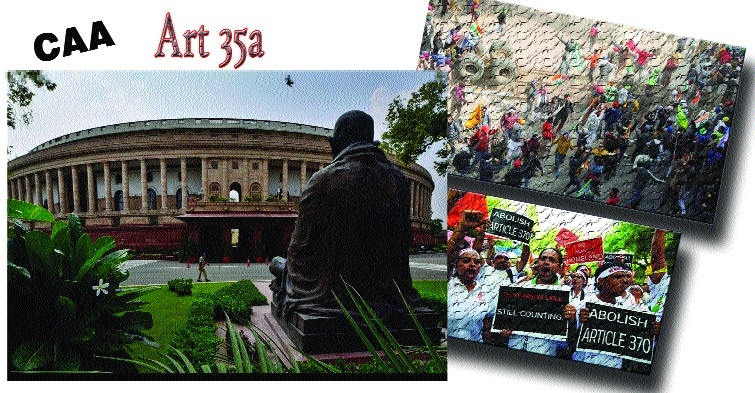Dangerous game
| Date :25-Nov-2021 |

By Vijay Phanshikar :
Taken separately, all these developments appear separate verticals in the panoply of domestic Indian politics. If considered together, a dangerous connection emerges from beneath the surface to stun us, to threaten not just us the people but also hit at the very foundation of India’s sovereign system of democracy in which Parliament occupies a central spot as a peak symbolism of representative democracy. All these developments seem to challenge not just some laws passed by Parliament, but also challenge Parliament itself and its primacy in the larger Indian system of government and governance. When we consider this complete picture, we realise that a dangerous trend is making its dirty effect felt on the Indian collectivism. The latest expression of this unholy trend has come by way of the development as regards the three farm legislations which the Government agreed to repeal after one full year of protests at Delhi’s borders by people who described themselves as farmers.

The Government may have had its genuine reasons for first refusing to budge for one full year and then to agree to withdraw the three laws. The protesters appeared happy over the development, but suddenly changed their strategy and now wish to continue with the stir until all their demands were met. By itself, this development is full of a unique strangeness. But as the Government changed its stance -- for whatever reasons -- a couple of other demands too sprang up from the country’s political landscape. Those demands were very much live on the scene, though were not being spoken on repeatedly -- possibly because the farmers’ protests were already going on. But as the Government appeared to have backtracked a step, a demand came up for a similar withdrawal or cancellation of the Citizenship (Amendment) Act -- CAA -- that had held the nation at ransom for long months before the coronavirus pandemic broke over the country. The people who have begun raising this demand again appear to believe that they may be able to push the Government to the wall -- and have their demand of the CAA withdrawal fulfilled. Simultaneously, another demand too came up -- asking for withdrawal of the abrogation of the Articles 35A and 370 of the Constitution of India in Jammu and Kashmir.
Those who raised the demand want Kashmir’s Special Status to be restored. They also want withdrawal of the decision to split the erstwhile State of Jammu and Kashmir into two Union Territories of J&K and Ladakh. One more demand, too raised its head once again in quick succession, though not in a very pronounced manner -- withdrawal of the law declaring instant triple talaq (among Muslims) illegal. Here we enter an intemperate zone. For, all the four laws -- scrapping of instant triple talaq; abrogation of Special Status to Kashmir; the Citizenship (Amendment) Act; and three farm laws -- were passed via proper parliamentary procedures. The Government had brought up properly drafted Bills in their regard in Parliament, allocated enough time for detailed discussion on them (in which members of Parliament of all political parties participated), and then had them passed with proper majority counts. But no sooner was each of those laws passed by Parliament, protests appeared in the streets demanding their immediate scrapping. In most cases, the protesters appeared to reject what the country’s highest law-making body -- Parliament -- had done. So loud and acrimonious did the protest become that the Government felt terribly embarrassed -- as if it had committed certain crime from which there was no atonement.
In the case of anti-CAA protests particularly in national capital New Delhi, protesters occupied a complete street, created lots of inconvenience to countless citizens for months, and even planned to disturb the otherwise smooth social atmosphere by way of looting and arson. In fact, the Government could have acted tough to pick up the protesters and clear the Shaheen Baugh road and area. For reasons best known to itself, the government allowed the sit-in at Shaheen Baugh. So dirty did the scene become that the protesters indulged in wanton violence in New Delhi right when United States President Mr. Donald Trump and his family were on a visit to the country. If the coronavirus pandemic had not hit the country, the Shaheen Baugh protests would have gone on for quite some time more. Exactly similar was the case with the current farmers’ sit-in. The Government could have uprooted the protesters’ tents in no time for reasons of public convenience, but chose instead to let things go from bad to worse. There is a common thread running through all the four of these agitations -- the Parliament passes a law through appropriate procedures, and then some people in the street reject it outright, and seek its complete withdrawal. The picture, thus, is that the people of the land are in conflict with the Parliament of the land.
Of course, this is only a lop-sided version of the reality. For, in all these cases, the numbers of protesters were abysmally small, but some vested interests tried to give it a larger-than-reality persona. The effort was clear -- to malign the country’s Parliament as a body that passes laws that are unacceptable to the people. Even a street urchin would tell that the whole picture is hollow and fake and the fact of the matter is that the larger country has accepted what the Government -- and the Parliament -- has done as regards most laws. Such was the picture of India during the British regime. The people just rejected everything the British rulers did. Now also, the effort is the same -- to show that the people reject what the Government does even in Parliament, through appropriate procedures. This is a very dangerous game -- masterminded by people who are seeking to malign not just a few political personalities in power, but also larger India. It is time the larger society did something to frustrate such anti-national designs. It is time to teach these elements a lesson for life.